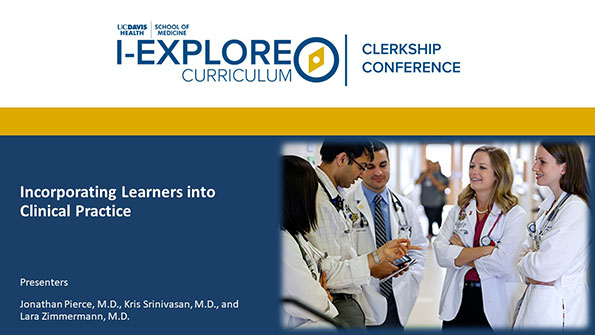Courses for Educators
Heard of HEAL?
The Health Sciences Educators' Academy for Learning (HEAL) aims to empower faculty educators to create enriching learning experiences for health sciences learners.
HEAL Educator Series
Each Educator Series is made up of multiple courses designed to advance excellence in health professions. While these courses are designed to be completed as a series, learners may also complete the courses individually.
Completion of these courses helps fulfill the minimum requirements for HEAL membership, however HEAL membership is not required.
Engaging Learners Through Instructional Excellence
The courses in this series are offered by HEAL, are available for all health sciences learners, and may be taken independently or as a series.
Virtual Courses (Live):
Essential Principles for Becoming a Master Educator
October 29, 2025, 12-1 p.m.
This course will introduce learners to fundamental principles in adult education assessment and how they relate to health professions learners in a medical environment.
Registration closed.
Creating a Curriculum from Scratch
November 12, 2025, 12-1 p.m.
Learning design shares common design principles with that of an architect who thinks through the audience, materials, measurements and how best to achieve the final product throughout the stages of planning and building. This course will walk educators through the process of designing education for health professions learners.
Registration closed.
How to Evaluate your Teaching and Courses
December 3, 2025, 12-1 p.m.
This session equips participants with essential tools for designing effective assessment and evaluation strategies in health professions education.
Registration closed.
Asynchronous Courses:
The Language of Learning
This course introduces foundational concepts in educational theory to enhance teaching effectiveness in the health professions. Participants will examine six core principles of adult learning and explore practical examples of how these principles apply to health professions education. This course also guides learners in applying Bloom's Taxonomy and Fink's Taxonomy to the design of impactful, learner-centered courses that promote deeper understanding and skill development.
The University of California, Davis, Health designates this live activity for a maximum of 1.25 AMA PRA Category 1 Credit(s)™. Physicians should claim only the credit commensurate with the extent of their participation in the activity.
Making your Teaching Count: Dissemination of Education
This session provides participants with practical guidance on advancing their educational scholarship. Learners will explore effective strategies for presenting and publishing scholarly work, gain insights into developing and submitting abstracts, and examine opportunities for securing internal and external grant funding. The session also introduces the Boyer Model's four views of scholarship, offering a comprehensive framework for understanding and contributing to the academic landscape.
The University of California, Davis, Health designates this live activity for a maximum of 0.5 AMA PRA Category 1 Credit(s)™. Physicians should claim only the credit commensurate with the extent of their participation in the activity.
Developing Learning Outcomes and Learning Objectives
This session focuses on the fundamentals of curriculum development using the backward design framework. Participants will learn to outline the steps of backward design and apply them to the creation of high-level, measurable learning outcomes for health professions education. The session will also clarify the distinction between course-level learning outcomes and learning objectives, guiding participants in crafting clear, concise objectives that align with broader curricular goals.
The University of California, Davis, Health designates this live activity for a maximum of 0.75 AMA PRA Category 1 Credit(s)™. Physicians should claim only the credit commensurate with the extent of their participation in the activity.
Essential Skills for Clinical Teaching
The courses in this series are offered by HEAL, are available for all health sciences learners, and may be taken independently or as a series.
Virtual Courses (Live):
Essential Skills to Teach Like a Champion
January 14, 2026, 12-1 p.m.
This course aims to educate health professions educators on eleven granular teaching skills that they can use in clinical settings and in the classroom.
Registration closed.
Giving Feedback so that it Works
February 18, 2026, 12-1 p.m.
This course aims to educate health professions educators on how to give effective feedback to learners. It will cover background on why learners do not receive feedback well and will teach concrete feedback techniques that will mitigate this problem.
The University of California, Davis, Health is accredited by the Accreditation Council for Continuing Medical Education (ACCME) to provide continuing medical education for physicians.
The University of California, Davis, Health designates this live activity for a maximum of 1.0 AMA PRA Category 1 Credit(s)™. Physicians should claim only the credit commensurate with the extent of their participation in the activity.
Creating an Effective Learning Climate
March 18, 2026, 12-1 p.m.
This course aims to educate health professions educators on how to create a safe and effective learning climate.
The University of California, Davis, Health is accredited by the Accreditation Council for Continuing Medical Education (ACCME) to provide continuing medical education for physicians.
The University of California, Davis, Health designates this live activity for a maximum of 1.0 AMA PRA Category 1 Credit(s)™. Physicians should claim only the credit commensurate with the extent of their participation in the activity.
Asynchronous Courses:
Clinical Microteaching
The University of California, Davis, Health is accredited by the Accreditation Council for Continuing Medical Education (ACCME) to provide continuing medical education for physicians.
The University of California, Davis, Health designates this live activity for a maximum of 0.5 AMA PRA Category 1 Credit(s)™. Physicians should claim only the credit commensurate with the extent of their participation in the activity.
Bedside Rounding
The University of California, Davis, Health is accredited by the Accreditation Council for Continuing Medical Education (ACCME) to provide continuing medical education for physicians.
The University of California, Davis, Health designates this live activity for a maximum of 1.0 AMA PRA Category 1 Credit(s)™. Physicians should claim only the credit commensurate with the extent of their participation in the activity.
Teaching Clinical Reasoning
The University of California, Davis, Health is accredited by the Accreditation Council for Continuing Medical Education (ACCME) to provide continuing medical education for physicians.
The University of California, Davis, Health designates this live activity for a maximum of 1.5 AMA PRA Category 1 Credit(s)™. Physicians should claim only the credit commensurate with the extent of their participation in the activity.
Taking your Teaching from Good to Great
The courses in this series are offered by HEAL, are available for all health sciences learners, and may be taken independently or as a series.
Virtual Courses (Live):
How to Teach in a Virtual World
March 25, 2026, 12-1 p.m.
Registration coming soon.
How to Host a Successful Hybrid Teaching Session
April 15, 2026, 12-1 p.m.
Registration coming soon.
The Art of Observation
May 6, 2026, 12-1 p.m.
Registration coming soon.
Asynchronous Courses:
How to Create a Podcast Teaching Session
Coming soon.
Leveraging Video and Social Media for Teaching Medicine
Coming soon.
How to Record and Edit a Teaching Session
Coming soon.
Failing Forward: Cultivating Growth Mindset, Mitigating Imposter Experience
Following this course, participants will be able to define how impostor experience, growth mindset, and self-compassion can impact learner development. They will be able to examine language to use to help a learner better incorporate feedback, as well as practice delivering feedback that maximizes learner growth.
Registration closed.
The University of California, Davis, Health is accredited by the Accreditation Council for Continuing Medical Education (ACCME) to provide continuing medical education for physicians.
The University of California, Davis, Health designates this live activity for a maximum of 1.0 AMA PRA Category 1 Credit(s)™. Physicians should claim only the credit commensurate with the extent of their participation in the activity.
On-Demand Courses
The following courses are available on-demand. If applicable, CME credit information will be posted with the course.
I-EXPLORE Curriculum Clerkship Conference: Nurturing Inclusive Clinical Education
"Expectations and Feedback” by Candice Sauder, M.D., Mark Servis, M.D., and Jocylen Glassberg, M.D.
"Effective Evaluations” by Jorge Garcia, M.D., and Micaela Godzich, M.D.
“Teach Like Champions” by Paul Aronowitz, M.D., and Melody Tran-Reina, M.D.
“Trauma Informed Educational Practices” by Piri Ackerman-Barger, Ph.D., and Andrés Sciolla, M.D.
“Power of Words” by Puja Chadha, M.D., Cherie Ginwalla, M.D., and Colleen Sweeney, Ph.D.
“Incorporating Learners into Clinical Practice” by Jonathan Pierce, M.D., Kris Srinivasan, M.D., and Lara Zimmerman, M.D.
See the Presentation (PDF)
12 Tips for Teaching Clinical Reasoning
After completing this module, the learner will be able to: (1) Identify key strategies for promoting improvement in clinical reasoning in learners; (2) Understand core approaches to teaching clinical reasoning through “compare and contrast” questioning of learners; and (3) Understand strategies for “diagnosing the learner" when learners struggle to collect patient histories and laboratory data and reason to a diagnosis.
**0.5 CME Credits are available for this course.
Clinical Microteaching: Breaking It Down
At the end of this course, participants should be able to: Demonstrate how to use simple questions to accurately diagnose learners, laying the foundation for effective feedback and efficient clinical teaching. Understand the critical role of learning climate on the educational process and outcomes. Recall the four steps of the One Minute Preceptor. Examine your own communication style and analyze the clinical thinking process of learners to enhance teaching effectiveness.
**0.5 CME Credits are available for this course.
MedEd Moments: Giving Feedback
This lesson covers effective methods for giving feedback to learners. Borrowed from a faculty development series, is used with permission from the University of Alabama at Birmingham.
MedEd Moments: Setting Expectations
This lesson covers effective ways of setting expectations with medical students and residents. Borrowed from a faculty development series, It is used with permission from the University of Alabama at Birmingham.


